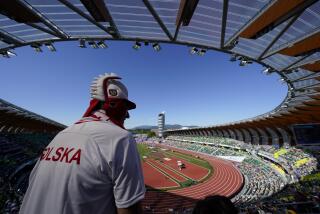Rodney W. Rood, 88; Played Key Role in 1984 Olympics, Built Support for Metro Rail
Rodney W. Rood, a former Arco executive who played a central role in bringing the 1984 Olympics to Los Angeles and helped mobilize support in the business community to build the Metro Rail system, died Friday at his Pasadena home after a long illness. He was 88.
Rood belonged to a core group of civic leaders appointed by Mayor Tom Bradley and chaired by lawyer John C. Argue to lead the negotiations for Los Angeles to host the 1984 Summer Olympics. The proposal was so controversial that critics mounted an effort to give voters the power to stop the Games, but Rood argued in a 1977 Los Angeles Times opinion piece that the Olympics would enrich the local economy and enhance the city’s position in history and contemporary society.
Los Angeles was awarded the Games in 1978. In 1979 Rood became a vice chairman of the Los Angeles Olympic Organizing Committee. He later joined its staff as a top protocol officer whose duties included greeting foreign dignitaries and officials of both the U.S. and international Olympic committees when the Games commenced.
“His style was low key, and he was very diplomatic,” said David Simon, a vice president of the organizing committee who now heads the Los Angeles Sports Council. “I don’t think I ever heard him raise his voice in all the years I knew him. But when he spoke at a meeting, what he had to say was usually worth listening to. And he was very effective on the telephone, working his network of friends and associates in pursuit of a cause.”
The privately funded Los Angeles Olympics were the most financially successful Games in history and became a model for other host cities.
Friends and associates said Rood embodied a kind of civic player rare in Los Angeles today.
During a three-decade career with Arco, during which his main responsibility was to establish the company’s profile in public affairs, “he made Arco a vital part of Los Angeles,” county Supervisor Yvonne Brathwaite Burke said Tuesday.
During the 1970s and ‘80s, Burke said, “companies that had offices in Los Angeles were identified vitally with what was going on with the civic organization of Los Angeles. There was a downtown [business] community, and they were a part of every major decision involved with civic and charitable efforts.... They were people of status who were part of the corporate community and had a real corporate consciousness. Rodney Rood was a leader in that.”
Today, corporate involvement downtown has diminished because of mergers and foreign ownership. Arco, for example, was a major civic and philanthropic presence in the city for years but was bought by British Petroleum in the late 1990s.
Rood was vice president and assistant to the chairman of Arco while working for the Olympic committee. His position as public affairs liaison for the oil company led to prominent roles in a number of other civic organizations and campaigns, including chairing the Central City Assn. from 1983 to ’85. He was active in Republican politics and was a delegate to the Republican National Convention in 1976.
Rood was one of the two original co-chairmen, along with insurance executive George Gibbs, Jr., of an effort directed by a group of downtown businessmen to win political support for the $3-billion Metro Rail system when it was still in the planning stages. The lobbying campaign scored a major success in 1983 when it helped local authorities win $117 million in federal funds to start building the 18-mile subway system.
The campaign’s methods raised eyebrows among some observers. It used private donations to send influential legislators on tours of foreign subway systems and paid them honorariums to speak to groups of Metro Rail boosters at Arco’s downtown headquarters. The campaign also held fundraisers for members of Congress from as far as New Jersey whose votes were considered crucial to Los Angeles’ mass-transit future.
“We’re at a big disadvantage,” Rood told The Times in 1984, when the city was competing for more than $2 billion in federal transit funds. “We’re way out here on the West Coast, and it takes a lot to get a congressman to come out here and look at our project.”
Rood was born in Minneapolis and moved with his family to the San Joaquin Valley town of Turlock in the 1920s. He later attended UCLA and served in the Navy in the Philippines during World War II.
After the war he worked for Fletcher Bowron, mayor of Los Angeles from 1938 to 1953, and headed a consulting firm called Republican Associates.
Rood joined Richfield Oil Co. as assistant to the president in 1953 and stayed with the company, which later became Arco, for 32 years.
In 1985 he became the first recipient of the Central City Assn.’s City of the Angels award.
He also received the William May Garland Award from the Southern California Olympic Committee in 1979.
Rood is survived by his wife of 64 years, Margaret Anne; two sons, David and Brian; two granddaughters, Aliza and Erica; two brothers, Woodrow and Donald; and a sister, Pauline Anderson.
A memorial service will be held at 2 p.m. today at Villa Gardens, 842 E. Villa St., Pasadena. The family asks that any memorial donations be sent to the UCLA Foundation, Alzheimer’s Research Fund #610680, UCLA Medical Science Development, 10945 Le Conte Place, Suite 3132, Los Angeles, CA 90095.
More to Read
Go beyond the scoreboard
Get the latest on L.A.'s teams in the daily Sports Report newsletter.
You may occasionally receive promotional content from the Los Angeles Times.





